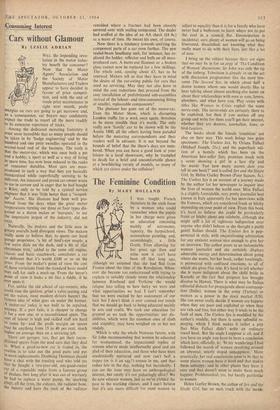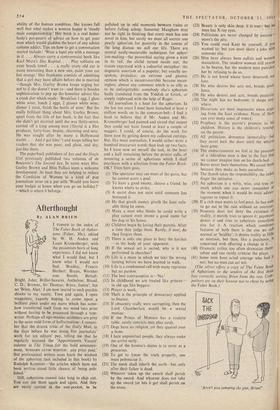The Feminine Condition
By MARY HOLLAND
I WAS taught French literature in the sixth form by a woman who could remember when the pupils in her charge were given an education consisting mainly of astronomy, tapestry, the harpsichord, watercolour painting, and,
astonishingly, a little Greek. Even allowing for her great age then and mine now it can't have been all that long ago, although we assumed that she had fled from France about the time of the Revolution. When- ever she became too embarrassed with trying to explain in suitably cloudy terms the relationship between Rimbaud and Verlaine she would relapse into telling us how lucky we were and what opportunities we had. I can't remember that we were excited by her assessment of our luck but I don't think it ever crossed our minds that we should go back to being educated mainly in arts and crafts. We took our education for granted as we took the opportunities; our dis- abilities, which were the common ones of sloth and stupidity, may have weighed on us but not unduly.
Which is why the whole Newsom furore, with Sir John recommending that women be educated for womanhood, the impassioned replies of women who've made intellectually good and are glad of their education, and those who have been academically nurtured and now can't boil a nappy (or is it an egg?) arouse in me, and that rather late in the day, nothing but incredulity. I can see the issue may have an anthropological interest, but surely it's not pulsatingly alive? We do now educate women, just as we've yielded the pass to the working classes, and I can't believe that it's any more difficult for most women to adjust to equality than it is for a family who have never had a bathroom to learn where not to put the coal in a council flat. Emancipation is incidental; sure, plenty of women will go on being frustrated, dissatisfied, not knowing what they really want to do with their lives, just like a lot of men.
I bring up the subject because there are signs that we may be in for an .orgy of 'The Condition of Women' discussions. Sir John was only the tip of the iceberg. Television is already in on the act with discussion programmes like the most tire- some The Second Sex, in which about half a dozen women whom one would dearly like to hear talking about almost anything else natter on about their relationships with men as sons, lovers, plumbers, and what have you. Play series with titles like Women in Crisis exploit the same nerve-ends. The nerve-ends are certainly there to be exploited, but then if you section off any group and write for them you'll get their interest, whether they are doctors, journalists, Jews, or bird-fanciers.
The books about the female 'condition' are also on their way. This week brings two prize specimens : The Useless Sex, by Oriana Fallati (Michael Joseph, 21s.), and the paperback edi- tion of a homily which has been on the American best-seller lists, promises much with a cover showing a girl in a lace slip and the words 'Just how many secrets dare you tell in one book?' and is called Sex and the Single Girl, by Helen Gurley Brown (Four Square, 5s.). The Useless Sex is an account of a journey made by the author for her newspaper to inquire into the lives of women the world over. Miss Fallaci is a slightly formidable, very pretty journalist best known in Italy apparently for her interviews with the Famous, which are considered frank or bitchy depending on your point of view. From this book it's hard . to believe she could be particularly frank or bitchy about any celebrity, although she might spill a Jot of righteous indignation over anyone who didn't behave as she thought a parfit gentil Italian should. The Useless Sex is pop- personal in style, with unquestioning admiration for any eminent woman nice enough to give her an interview. The author poses as an indomitable woman journalist and she certainly displays admirable energy and determination about going where she wants, but her book, rather touchingly, is permeated with confused emotions, to all of which she gives free rein. It's hard to tell whether she is more indignant about the child bride in Karachi or the fact that progress has brought divorce to Hawaii. There is what may be Italian editorial distaste for propaganda about contracep- tion (India), women in the army (Turkey) or women as a power in the stock market (US). She can never really decide if women are happier when they are poor and exploited or when they are rich and free, but either way it tends to be the fault of men. The Useless Sex is muddled by the author's muddle, but there is some splendid re- porting, which I think makes it rather a pity that Miss Fallaci didn't write an ordinary travel book. But the angle I suppose is all, and if you have an angle you have to have a conclusion which here, officially, is: 'In my wanderings I had followed the march of women revolving around an abysmal, utterly stupid unhappiness.' More practically, her real conclusions seem to be that in some places women have it hard and that makes them unhappy, and in other places they have it easy and that doesn't seem to make them much happier. Problematical, yes, but hardly particular to women.
Helen Gurley Brown, the author of Sex and the Single Girl, has no such truck with the inevirt-
ability of the human condition. She knows full well that what makes a woman happy is 'steady male companionship.' Her book is a real home- body's pot-pourri of advice on how to get your man which would gladden the heart of any advice column addict. Tips on how to get a conversation started include: 'Wear a lapel pin with a message in it. .. . Always carry a controversial book like Karl Marx's Das Kapital. . . . Play solitaire on your beach towel . . . a really crazy old car is more interesting than a new one, paint your car hot orange.' Her frankness consists of admitting that a girl may have affairs before she is married —though Mrs. Gurley Brown keeps urging her not to if she doesn't want to—and there is besides sophistication to pep up the homelier advice like a crash diet which reads: 'Breakfast 1 egg, 1 glass white wine; lunch 2 eggs, 2 glasses white wine; dinner I steak, finish the bottle of wine.' But the really brilliant thing about Mrs. Gurley Brown, apart from the title of her book, is the fact that she didn't get married until she was thirty-seven, carried off a king among men ('David is a film producer, forty-four, brainy, charming and sexy. He was sought after by many a Hollywood starlet.... And / got him !') and keeps telling her readers that she was poor, and plain, and shy, just like them.
The paperback publishers of Sex and the Single Girl previously published two volumes of de Beauvoir's The Second Sex. In some ways Mrs. Gurley Brown and Miss Fallaci seem a welcome development. At least they are helping to reduce the Condition of Women to a kind of pop journalism issue on a par with 'Would you leave your budgie at home when you go on holiday?' —which is where it belongs.



































 Previous page
Previous page